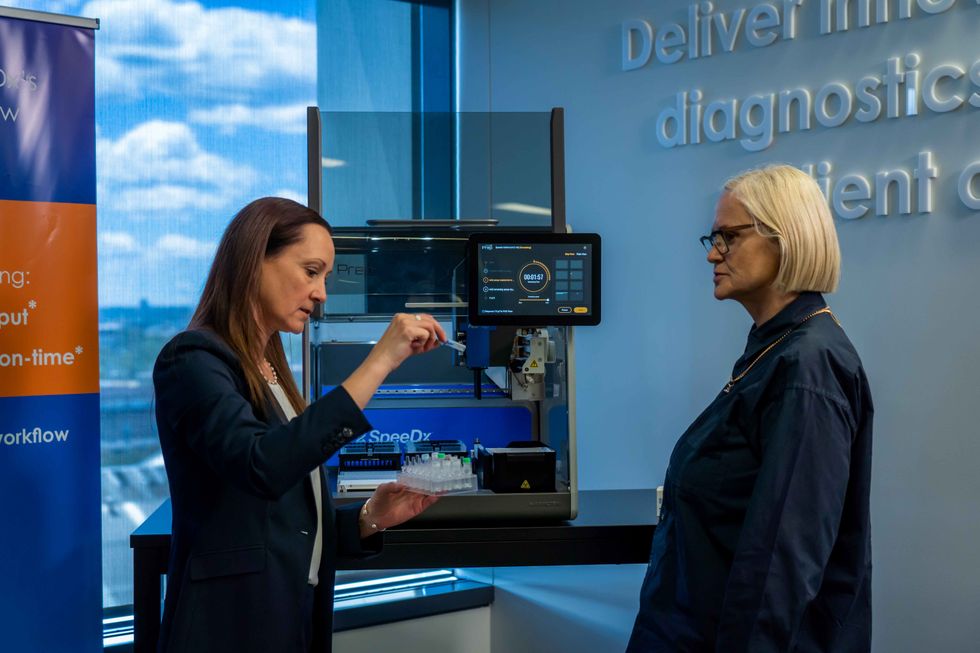Exploring Sydney’s Deep Tech Ecosystem

This sponsored article is brought to you by BESydney.
In the dynamic landscape of Australian technology, market advancements are often attributed to consumer-focused products like Canva and Afterpay. Capturing headlines and attention with their renowned success stories, these, along with other global companies like Atlassian, Facebook, and Apple, have become the face of the tech industry.
The accomplishments of these companies are remarkable. They generate immense wealth for stakeholders and employees and boast a staggering market value. But this high-profile side of the industry is just the tip of the iceberg. Deep tech - characterised by breakthrough scientific innovations - is where hidden impacts take place. Beneath the surface of these tech giants lies a thriving industry dedicated to researching and developing solutions that address large-scale problems, with a profound effect on society.
The power of deep tech
The tech industry in Australia is a powerhouse, employing one in 16 Australians and ranking as the country's third-largest industry. In 2021, it accounted for 8.5 percent of the GDP, an undeniably significant contribution to the nation's economy.
For nearly two decades, Sydney has also nurtured a thriving community of resilient problem solvers, quietly pushing the boundaries of scientific discovery. While consumer-focused tech giants often steal the spotlight, it is imperative to recognize the profound impact of deep tech solutions that operate behind the scenes.
From eco-friendly fabric manufacturing and hydrogen storage to molecular diagnostics and sustainable alternatives to plastics, Sydney's brightest minds are tackling some of the world's most pressing challenges.
The transformation of deep tech startups
Navigating the deep tech landscape is no small feat. These enterprises offer long-term solutions to pressing global challenges - a benefit that cannot be ignored - but deep tech innovations require significant time for research and development, often incubating for years before reaching the market.
They demand substantial investment and unwavering focus. Finding the right path to commercialization is paramount. Thankfully, incubators are emerging as champions in successfully transforming deep tech startups into thriving businesses.
Sydney's DNA demands a deep-rooted vision, an unwavering belief in problem-solving, and the determination to persevere despite challenges." -Sally-Ann Williams, Cicada Innovations
Cicada Innovations is Australia's oldest and largest deep tech incubator. It knows better than anyone the extent to which Australia's deep tech evolution hinges on the power of startups. With over 365 resident companies incubated, over $1.7 billion raised, over $1.4 billion exits, and over 900 patents filed, these dynamic ventures are already spearheading groundbreaking advancements.
It's creating intelligent robots and pioneering scaled drone delivery to minimize environmental impacts in transportation. It's slashing the cost of cancer drugs, offering hope for prolonged lifespans and alleviating suffering. And it's crafting innovative farming tools to enhance agricultural yields and contribute to global food security.

A thriving hub for deep tech innovation
With its vibrant ecosystem, Sydney emerges as an ideal hub for unveiling and further developing deep tech innovations. The Australian spirit, shaped by resilience and problem-solving, thrives in this city. Sally-Ann Williams, chief executive of Cicada Innovations, affirms that Sydney's DNA demands a deep-rooted vision, an unwavering belief in problem-solving, and the determination to persevere despite challenges."
The city offers a supportive community, facilitating connections and access to the talent necessary for entrepreneurs to pursue their dreams. It's this unique blend of ingredients that fuels the growth of deep tech companies, propelling them toward success.

Discover deep tech at Tech Central
Deep tech is just one facet of what's happening at Tech Central. While we shed light on these industry accomplishments and celebrated breakthroughs, it's crucial to support and foster the growth of a wider industry: one that thrives on resilience, problem-solving, and visionary entrepreneurship.
Sydney - with its unique blend of community, talent, and resources - stands at the forefront of this transformative revolution, ready to propel tech innovation for the benefit of all.
For more information on Sydney's Tech Industry and hosting your next conference in Sydney, visit besydney.com.au.
A Closer Look at Deep Tech InnovatorsTo truly grasp the essence of deep tech, we must explore the stories of individuals and companies that are driving change. Here are a few examples of how deep tech is flourishing at Tech Central:
Xefco is a groundbreaking new materials company revolutionizing fabric manufacturing. Its innovative process significantly reduces water usage by up to 90% and eliminates the need for dyes and harsh chemicals. Traditionally, textile mills worldwide have polluted rivers and harmed local communities - Xefco aims to transform the textile industry, benefitting both the environment and economically disadvantaged communities worldwide.
Rux: Empowering the hydrogen economyAnother trailblazing company in Sydney's deep tech ecosystem, Rux Energy is tackling the challenge of hydrogen storage. Hydrogen presents immense potential in the energy transition movement, but efficient and scalable storage solutions are essential for its widespread adoption. Rux is developing new materials and technologies to store hydrogen more effectively, paving the way for a cleaner and more sustainable future.
SpeeDX: Revolutionising molecular diagnosticsAmidst the global pandemic, SpeeDX, a Sydney-based company, emerged as a key player in molecular diagnostic testing and antimicrobial resistance. SpeeDX aims to address the rising concern of antibiotic overuse by providing personalized recommendations for effective treatment. This groundbreaking technology has far-reaching implications, reducing unnecessary antibiotic usage, minimizing the risk of antimicrobial resistance, and safeguarding public health on a global scale.